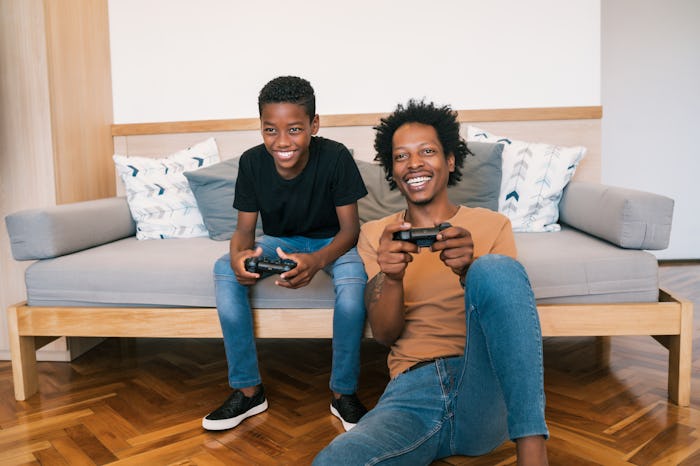Life

How Shy Kids Are Affected By Social Distancing, According To Psychologists
Parents of shy or introverted children are often forced to balance their children's comfort with the need to help them grow by forcing them to interact with others. And that's why this quarantine has a lot of parents wondering how shy or introverted kids will be affected by social distancing, because on one hand, there's no interaction with others — which they might love — but on the other hand, is that moving their progress back a notch?
It's important to note that being shy or introverted is nothing that needs curing. Both of my kids are both shy and introverted, and I myself am not a fan of most types of human contact. However, we all have to learn to survive basic levels of expected interactions if we are to be successful human beings. A lot of that happens in school and on the playground and right now, those avenues are closed. Psychotherapist Dr. Annette Nunez tells Romper that this time is affecting these shy kids in a number of ways, noting that they might be a lot calmer right now because there is no pressure to be around people who might make them uncomfortable.
However, she says that this is also potentially problematic. "Children socialize through playing with their peers. Lots of problem solving, creativity, and navigating social relationships happen on the playground. Children who are shy and introverted are missing out on this big social piece and this may make it challenging for them when they go back to school." It might be a step back in their progress.
Dr. Hillary Goldsher, a clinical psychologist, agrees, adding that while all children will be affected by the quarantine, how shy or introverted kids will be affected by social distancing might seem more pronounced when it ends, rather than in the moment. "Returning to more normal modes of interaction may provoke anxiety and resistance for those children who feel soothed by a version of isolation and sureness. Such feelings could also cause a decline in academic performance and social connection," Goldsher says. It makes sense if you think about it. For those of us who are introverted fall into a "quiet" routine, having that routine disrupted can throw everything out of whack. For kids, this is amplified because it is still new to them, and they are still leaning to adjust.
Thankfully, Goldsher notes that there are some strategies that parents can employ to help children through this transition period. She tells Romper, "Any such struggles should be directly addressed through parental or caregiver support and with the assistance of a mental health professional. Children are incredibly resilient. In most cases, with a little bit of guidance, encouragement, and love, they will indeed regain their skills of relatedness and social risk tolerance."
And that's not all parents can do. Licensed professional counselor Lakiesha Russell tells Romper that parents might try to have their kids join a virtual play group or a virtual facilitated group. While it's not exactly the same as in-person meet ups, it does provide children with a similar stimulation. "At least in this way the facilitator or therapist will be able to provide activities to help them manage their social anxieties and come out of their shell more."
She adds that if going outside or reentering the community is stressing out your little introvert, there are ways to address it that are healthier than just expecting them to cope. "Allow them the opportunity to share with you that anxious or fearful thought and have them challenge it with a positive one." Specificity with your instruction is key.
Russell says, "If your child shares with you that they are afraid of interacting with other kids after COVID, you can acknowledge that thought and them have them go down the list of ways that they will protect themselves, and maybe it's wearing a mask, maintaining a safe distance, not shaking hands or hugging, or even being in a setting where there are more than a specific number of kids." Parameters are your guide here, because shy and introverted kids often feel the need for set boundaries more than extroverted children or ambiverts.
We are all stressed, and while some of us — parents and children both — are more comfortable with staying home than others, we all have to come out of this on the other side somehow, and hopefully we can help our kids ease into it with confidence.
Experts:
Psychotherapist Dr. Annette Nunez of Breakthrough Interventions
Dr. Hillary Goldsher, clinical psychologist
Licensed professional counselor Lakiesha Russell
This article was originally published on